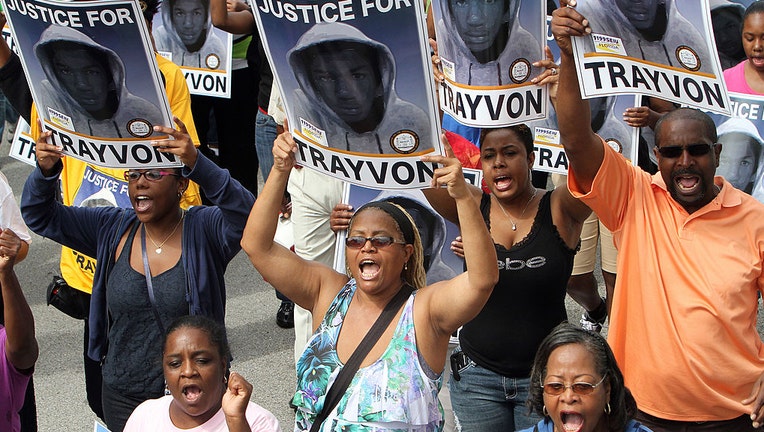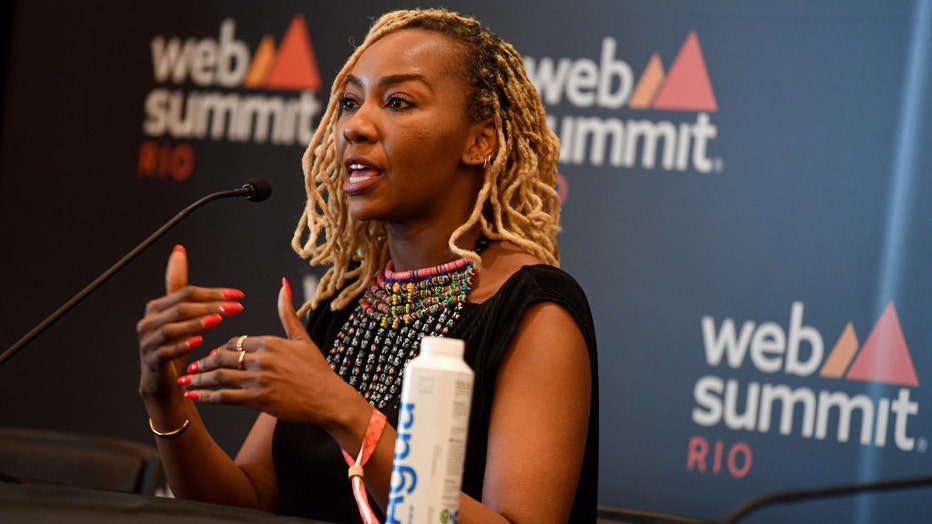Black Lives Matter movement marks 10 years of activism, continues push to defund the police

Thousands of demonstrators march during an NAACP rally and march demanding for justice in the shooting of Trayvon Martin, Saturday, March 31, 2012. (Gary W. Green/Orlando Sentinel/Tribune News Service via Getty Images)
The Black Lives Matter movement hits a milestone on Thursday, marking 10 years since its 2013 founding in response to the acquittal of the man who fatally shot 17-year-old Trayvon Martin.
Gunned down in a Florida gated community where his father lived in 2012, Martin was one of the earliest symbols of a movement that now wields influence in politics, law enforcement and broader conversations about racial progress in and outside the U.S.
BLM activists and organizations plan to mark a decade of the movement with in-person and virtual events. Calls to action include a renewed push to defund police departments and reinvest in Black communities that have suffered disproportionately from police brutality, unequal treatment in criminal justice systems and mass incarceration.
RELATED: Celebrities, brands donate in support of Black Lives Matter movement
In the wake of Supreme Court decisions that stymied relief from student loan debt held disproportionately by Black borrowers and banned affirmative action in higher education, the need for BLM's existence couldn't be more clear, said prominent movement activist Melina Abdullah.

A press conference with Black Lives Matter co-founder Ay Tometi during day one of Web Summit Rio 2023 at Riocentro in Rio de Janeiro, Brazil. (Eóin Noonan/Sportsfile for Web Summit Rio via Getty Images)
"What this movement moment means is that we have to absolutely redouble our efforts and redouble our commitment to making Black lives matter," said Abdullah, who is a director of BLM Grassroots Inc, a collective of organizers across the country.
"Ten years in, we’re getting a glimpse at what would happen if there were no Black Lives Matter," she said. "We’re not just going to fight when it’s popular, but we’re going to fight because we need to fight."
RELATED: BLM organizer defeats veteran Democrat in House primary
In Los Angeles on Saturday, the "#BLMTurns10 People’s Justice Festival" will be held in Leimert Park, a historic neighborhood and cultural hub for Black Los Angelenos. The festival is designed to feel like a village and will include a pop-up garden dedicated to families of people killed by police and white supremacist violence.
Festival organizers have invited Sybrina Fulton, Martin's mother, to speak. Scholar and activist Dr. Cornel West, who is running for U.S. president as a third-party candidate in 2024, has been invited to give the festival's keynote address.

Patrisse Cullors, Co-Founder of Black Lives Matter speaks at the NILC Courageous Luminaires Awards Honoring 21 Savage on October 03, 2019 in Los Angeles, California. (Jerritt Clark/Getty Images for NILC)
The BLM movement first emerged in 2013, after the acquittal of George Zimmerman, the neighborhood watch volunteer of mixed white and Hispanic heritage who killed Martin a year earlier. Zimmerman claimed to authorities that he acted in self-defense when he shot Martin. He also acknowledged to an emergency dispatcher that he had followed and profiled the Black teen as a potential burglar in the Sanford, Florida, gated community.
RELATED: Adidas won't object to Black Lives Matter group's trademark application for logo
Martin's encounter with Zimmerman, as well as the delay in arresting and charging the gunman in the killing, raised questions about how police handle suspected acts of vigilantism against Black victims. In 2012, former President Barack Obama, the nation's first Black commander-in-chief, underscored public concerns over fairness in the case when he said: "If I had a son, he'd look like Trayvon."
On July 13, 2013, a Florida jury of six women, all but one of them white, found Zimmerman not guilty of second-degree murder or manslaughter. The immediate response to the verdict reverberated in Florida and across the U.S., energizing a new generation of Black racial justice groups including the Dream Defenders and BYP100.
BLM co-founders Patrisse Cullors, Alicia Garza and Ayo Tometi — the three activists are credited with using the phrase as an affirmation and an organizing strategy — initially pledged to build a decentralized organization governed by the consensus. The August 2014 shooting death of 18-year-old Michael Brown at the hands of police in Ferguson, Missouri, helped the phrase "Black lives matter" become a potent rallying cry for progressives and a favorite target of derision for law enforcement unions and political conservatives.
But just three years into its existence, all but one of the founders remained involved in the movement's burgeoning organization. And in 2020, an unprecedented wave of donations to the movement following protests over George Floyd’s murder by Minneapolis police meant that BLM needed more infrastructure.
Amid disputes with grassroots activists about the direction of the movement organization, the Black Lives Matter Global Network Foundation Inc. has been steward over a charitable endowment worth tens of millions of dollars. BLM Grassroots Inc. operates separately.
The foundation is marking the 10-year BLM anniversary with the launch of the campaign it's calling Defund the Police Week of Action. On Monday, it released a digital ad renewing 2020 rallying cries for defunding police departments. The organization is also encouraging supporters to ask local and national elected officials to introduce a draft proclamation that establishes July 13 as "Black Lives Matter Day."
"As we continue our push to defund the police, invest in Black communities and reimagine safety in our communities, we need our elected officials to focus on the people, not police," BLM foundation board member D’Zhane Parker said in a statement.
"The safest places around the world don’t have more police, more jails, more prisons, or harsher sentences," she said. "They have better access to economic opportunities, quality education, stable housing, and health care."

